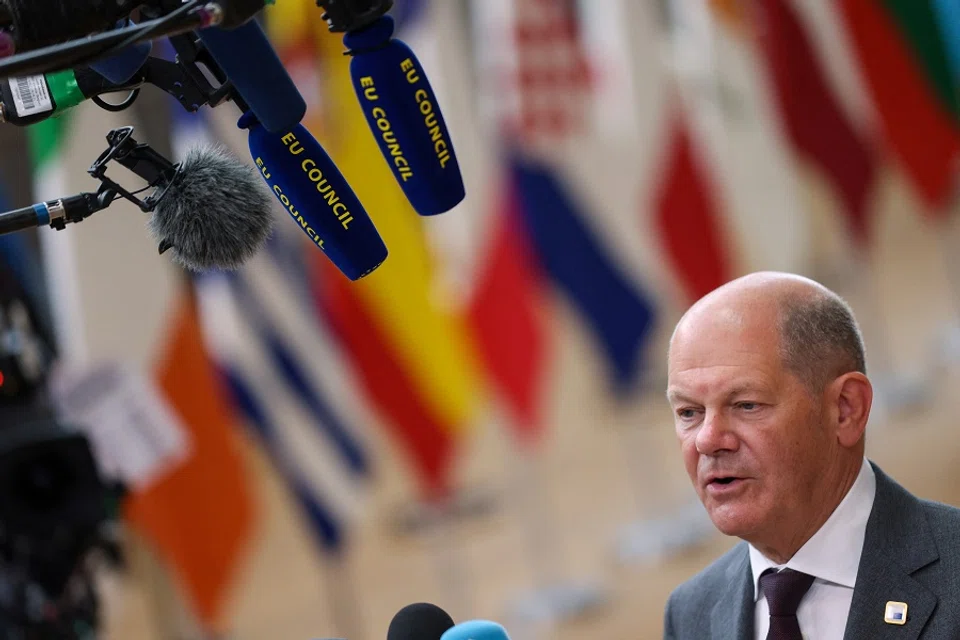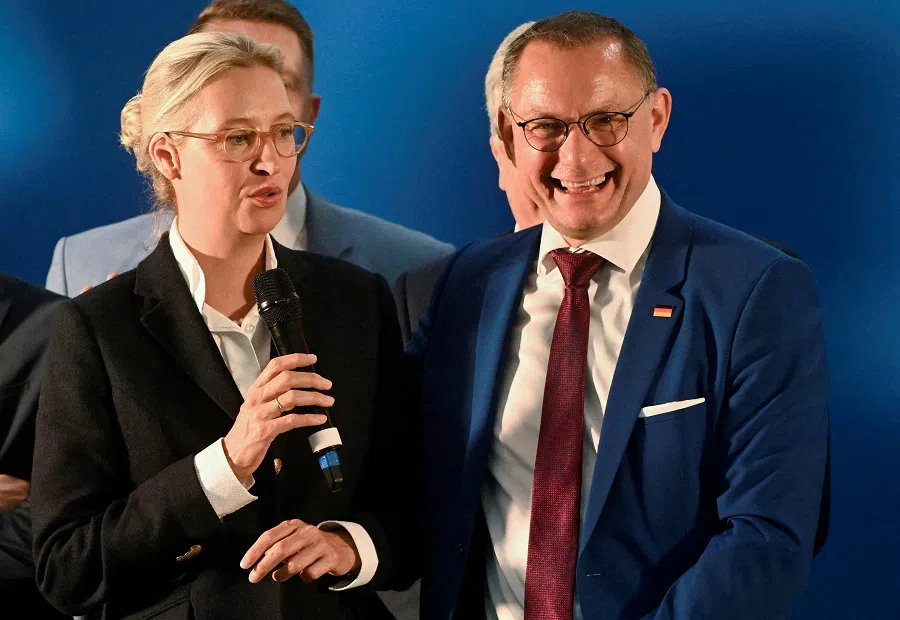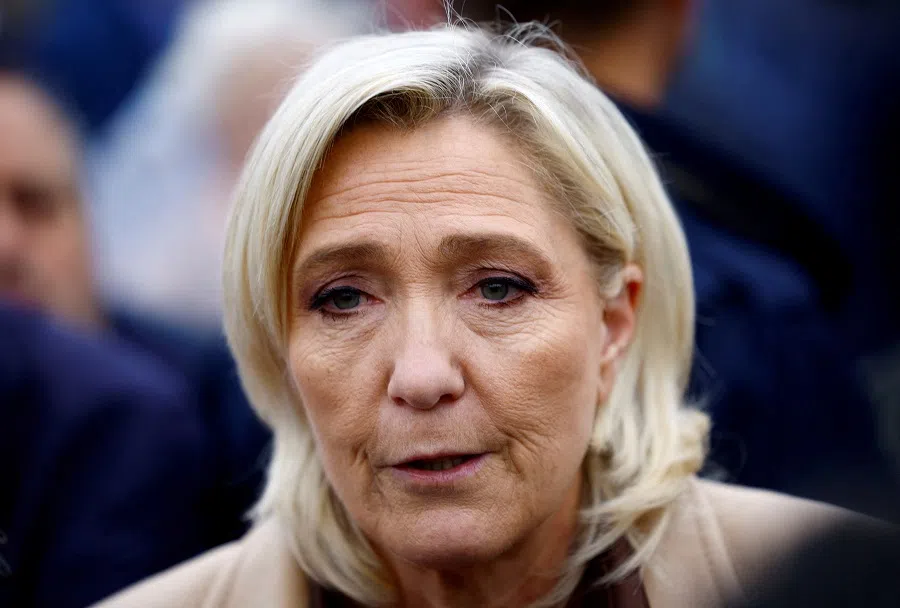Far-right wave sweeps Europe, could Germany be next?
Commentator Victor Wong believes that Italy’s experience has shown Europe that a country will not be plunged into crisis with the far right in power. So will the far right see its next rise in Germany?

Since far-right candidate Giorgia Meloni became the prime minister of Italy in 2022, the extreme right appears to have emerged from the political wilderness into positions of power within parliaments across Europe.
Far right gaining ground
On 7 July, the far-right National Rally (formerly National Front) might have lost the French election — winning only 142 seats to come in third among political parties — it still came in first place for votes cast, garnering 37.1% of the total.
Indeed, the coalition of the left-wing New Popular Front (NFP) and the centrist alliance Ensemble to avoid splitting votes had proven effective, enabling the NFP to win 188 seats — the most of any group — but it had won only 26.3% of the votes. Ensemble won 161 seats and just 24.7% of the votes. Both parties were far behind National Rally in terms of vote share. The rise of the far right in France cannot be underestimated.
The ballot showed that the election was no longer a battle among the left, centre and right, but one between the extreme right and the anti-far right. It also heralds the arrival of the far right to the mainstream, and the group could well govern in the not too distant future.
Europe’s attitude on the Ukraine war and China issues could shift as the presence of the far right — which is generally friendly towards Russia and China — in European parliaments expands.
In Germany, the far-right Alternative für Deutschland (AfD) has won support from only 14% of voters — not enough to make it a contender to govern. However, with an integrated Europe, the impact of the far right coming into power in Italy and going mainstream in France will still be felt in German politics.
Europe’s attitude on the Ukraine war and China issues could shift as the presence of the far right — which is generally friendly towards Russia and China — in European parliaments expands.

Coincidentally, for six months from 1 July, the extreme right will also be heading up the European Union (EU) as Hungary takes its turn on the rotating EU presidency and hosts the EU ministerial conference and summit.
After the French election, Hungary’s Prime Minister Viktor Orban joined forces with the French National Rally leader Marine Le Pen and Italy’s Prime Minister Meloni to form the Patriots for Europe alliance, which has become the third largest political alliance in the European parliament.
Friendly towards Russia and China
On its 27 April cover, German news outlet Der Spiegel featured a close-up of a man wearing a suit with an AfD badge on his shirt collar and two pins on the jacket lapel: one a flag of China and the other a dragon. The man also donned a badge bearing the Russian flag on his chest, and peeking out from under his jacket is an envelope with a stamp of Russian President Vladimir Putin’s side profile.
The allusion that the AfD is working for Russian and Chinese interests is clear. The story behind the cover was the arrest of Guo Jian, the assistant of AfD lawmaker Maximilian Krah, on the suspicion of spying for China.
Should Europe collectively turn to the extreme right, military aid to Ukraine will not be suspended in the short term, but stipulated conditions of aid might lead to Ukraine not being able to attack targets within Russian borders...
The pro-Russian stance of Europe’s far right is not news. Krah has also been accused by the Dresden police of having received illegal funds from Russia. The same accusation has been levelled at Krah’s party colleague Petr Bystron who is the party’s number two candidate for the European parliamentary election.
France’s Le Pen has also been known to have close links to Russia, and in a recent televised debate, she voiced her opposition to providing Ukraine with long-range missiles. Italy’s Meloni holds similar views and has opposed Ukraine’s use of European aid weapons to attack targets within Russian borders.

Should Europe collectively turn to the extreme right, military aid to Ukraine will not be suspended in the short term, but stipulated conditions of aid might lead to Ukraine not being able to attack targets within Russian borders, which will reduce tactical flexibility — such as being unable to attack core districts in Russia with long-range missiles and turn the tide of war.
Far right no longer considered a menace
In 2022, Italy’s neo-fascist extreme right party Brothers of Italy took power, and Giorgia Meloni became the first far-right prime minister since the end of the Second World War. Brothers of Italy has always been eurosceptic, often expounding on the disadvantages of being part of the EU, and it also holds an anti-immigration stance.
Fear and suspicions were rife when the party won the election, and German magazine Stern proclaimed Meloni “the most dangerous woman in Europe”. However, those fears were proved unfounded after Meloni’s administration took the reins.
First, Italy’s economic performance has been stellar since 2022 compared with the major European economies, growing 4.0% in 2022 and 0.9% in 2023. According to OECD projections, the country is on track to grow 0.7% this year, significantly higher than Germany’s 0.2%.
Despite the fact that Italy’s economic growth is fuelled by debt under Meloni — Italy’s national debt is now 140% of its GDP, far exceeding France’s 100% and Germany’s 66% — the economy is indeed growing. This has served to dissipate the fear of the far-right among European voters, who are no longer averse to the nationalist right wing taking power nor see it as the end of the world.
However, just like Donald Trump, Meloni also did not implement some of the more extreme and contradictory ideas that had been espoused on the election trail after assuming power, and had been selective in honouring election promises.
When it comes to foreign affairs, the party is also largely in sync with the US and the EU. Italy’s experience has shown Europe that a country will not be plunged into crisis with the far right in power.

For example, despite the far right’s anti-immigration agenda, Italy actually saw record numbers of immigrants arriving with Meloni at the helm. In 2023, official data showed around 155,754 registered immigrants, skyrocketing some 50% from 103,846 immigrants in 2022. Faced with these figures, Meloni only said, “The results are not what we hoped for. It is certainly a very complex problem, but I am sure we will get to the bottom of it.”
Meloni has admitted that the party is not on the extreme right, rather it is a conservative party who is for cultural preservation, upholding traditional values, and in support of leaving the EU. When it comes to foreign affairs, the party is also largely in sync with the US and the EU. Italy’s experience has shown Europe that a country will not be plunged into crisis with the far right in power.
German preference for mature politicians
The media views 2022 as the year when the neo-fascists rose to power. Exactly a century ago in 1922, the National Fascist Party led by Benito Mussolini marched into Rome, kicking off a two-decade wave of fascism across Europe. When the fascists took control of Italy, Germany was still the open, free and democratic Weimar Republic, but it took just 11 years for Adolf Hitler’s Nazi Party to come into power.
History will of course not spontaneously repeat itself, but neither will it fade out without rhyme or reason. Compared with France and Italy, the Germans are more resistant to change; but once change arrives, it will be thorough.
Both France and Italy have elected prime ministers below the age of 40, sending a storm of youth sweeping through the political world. Germany, however, tends to favour maturity in their politicians, as seen by their choice of Angela Merkel and subsequently Olaf Scholz as chancellors.
It would seem unlikely then in the short term for Germany to follow in the footsteps of France and Italy by bringing the far right into the mainstream.

As it currently stands, the German public appears to be losing confidence in the “traffic light coalition”, and are showing a preference for Merkel’s Christian Democratic Union and Christian Social Union alliance, which has a support rate of 30%, far higher than AfD’s 14%.
It would seem unlikely then in the short term for Germany to follow in the footsteps of France and Italy by bringing the far right into the mainstream. But the AfD has already risen to second place among individual political parties in terms of voter share, which will make it the largest opposition party in the next federal election.
The far right might seem like a menace, putting out a hodgepodge of electoral promises while trying to win over voters. But with the framework of the democratic system, constitutional law and order, and non-violence principles in place, the far right is unlikely to put into action their extreme views once in power.
They would still have to abide by the laws and adhere to administrative procedures and democratic principles. And to govern successfully, a certain amount of selectiveness would still be required to separate the wheat from the chaff and give the public what it can accept, driving the betterment of the regime and to be a meaningful challenger.
This article was first published in Lianhe Zaobao as “法意极右冲击波震撼德国”.





